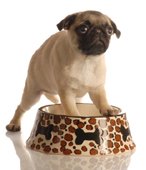 |
 | 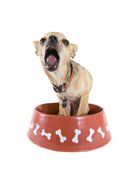
| |
House Training a PuppyBecoming a 'Dog Trainer' for Your Puppy (unofficially)House training a puppy must happen early in its life. Use a dog training leash to take your puppy outside for regular visits. Becoming a 'dog trainer' for your puppy will help in house training puppy; use training tips to speed up the house breaking training. House training a puppy is among the first orders of business when you bring home a new dog. You might have a book on house training puppy, or hopefully you have a good dog training leash. Nonetheless, equipment is only part of the picture. For example, a stack of newspaper wont magically create a well-behaved and well-trained dog that knows to ask to go outside to its bathroom. Note to potential pet owners: becoming a dog trainer (even if you're just training your own dog) takes time, patience and consistency. If youre not ready to invest all three, a puppy may not be the best choice for your family. On the other hand, when you give your puppy what he or she needs, youll be rewarded with many years of love and an accident free home once the dog is old enough. House Training a PuppyIn the context of this information, house training is about 'potty training' and becoming the leader of your dog. House training usually takes a month to two months depending on the dogs disposition and your overall lifestyle. House Training Puppy - PatternsPuppies are like people in that they like routine and structure. If you get your dog on a schedule for walks, food, etc. it actually helps with bladder and bowl control. Bear in mind that a two month old puppy can only hold their urine for two hours (a three month old can hold it three hours). If you wait longer than that guideline, be prepared to clean up. Additionally, waiting too long to urinate isn't good for your pup - it can lead to infections. Part of the pattern you want to establish is going outside regularly. As the dog gets older, you can space out the trips a little more (one hour per month of age). Also remember that dogs usually need to go out right after they wake up and after a meal. Speaking of which, don't just leave food out all the time. Have a set feeding schedule. Young dogs should be fed about three times a day, then taken out afterward. Again, this is part of the pattern youre establishing. Before bed time, put your dog's water out of reach (about 2 hours ahead). If you get up about 7 hours after your dog goes to sleep, it will be ready for that walk. House Training a Puppy: It's all about Communications.Learning how to communicate with your puppy is an important part of the training process. The tone and words you use with a puppy are important. If you're using a dog training leash, direct your puppy to a specific area of the yard every time, and use the same words to encourage the behavior you want. 'Good boy' or 'Good girl' aren't good choices since you'll probably want to keep these for other types of training inside the house. We use a keyword for house training: 'hurry up'. Reward your puppy when it succeeds or tries to succeed. Use praise, play, or dog treats. For example, as soon as the dog finishes, provide the treat and a pat on the head. This slowly imprints the dog with the knowledge that theyre doing something GOOD. Becoming a Dog Trainer for Your Pup: Stay AwareDon't let your pup wander around the house without someone watching. This can be a family project. The more unsupervised time your dog gets, the more likely it becomes that it will have an 'accident'. What are you watching for? Sniffing, circling and generally looking very anxious; and as they learn which door they go out of for their bathroom break they will go to the door and whine, or bark or scratch at it. Thats the time to step in and get the puppy outside. Think from a preventative perspective: try to anticipate your puppy's need. House Training Puppy - CratesA crate to your dog is like a cave - it's his or her own personal space. Many dog owners use the crate at night or when they're out of the house as a way of deterring elimination and bad behaviors. Crates can be a great helpmate to house training a puppy because dogs want their sleeping spaces clean. However, these should never be used as a punishment otherwise all the good they could do will be reversed. House training a puppy will take some time and patience; however most puppies learn fairly quickly and are eager to please you. And when they succeed, it will have been worth your dog training commitment. Taking Care of Your PuppyIn addition to house training a puppy and the general training of your puppy, you also need to take care of your pup's health and well being. Make sure to feed your pup healthy, homemade dog food and homemade dog treats: use natural (and if possible, organic) ingredients without adding chemicals or fillers that might make your dog sick or affect your pet's long term health. Also make sure to take your new pup to the veterinarian for a full check-up and for necessary vaccinations. Do start off your pet's personal care with regular teeth brushing (even with baby teeth (which fall out) for your pup to get used to having them brushed). Also brush your pup's coat daily. Check paw pads and nails once you start to take your puppy out for walks - their feet are sensitive. And check and clean their ears regularly: once a week, or more often if they like to roll around in grass and dirt. Some puppies, and dogs, may have ear mites, which can cause itching and discomfort. Clean your canine's ears with a natural, herbal remedy - PetAlive's Ear Dr., it is extremely useful for treating dog ear mites and ear infections. Return to top of House Training a Puppy. Return to The Dog Biscuit Home Page. | 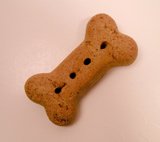 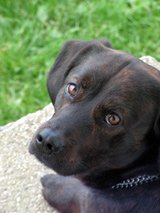 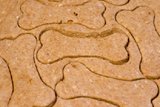 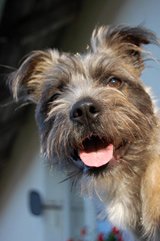 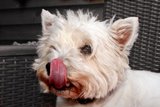 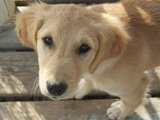 Related Articles
Each of these articles provides you with puppy information.
New Puppy Care Pet vaccines, neutering/spaying, check-ups, and more. How to Train a Puppy? Puppy training 101. House Training a Puppy Successfully training your new puppy - it's possible! Housebreaking a Puppy Your puppy needs to learn; housebreaking. Puppy Teeth: Dental Care Chewing and biting are normal symptoms of teething. Puppy Weight Estimates Are you able to estimate the potential weight of your pup at full growth? Puppy Worms: Treat Early Your pup's health is important; be aware of sick puppy symptoms and causes. | ||
|
Enjoy This Site?
Then why not use the button below, to add us to your favorite bookmarking service? | |||
|
| Home | About
| Contact | Sitemap
| What's New
|Privacy Policy |
This site is for informational purposes only. If you have an issue with your dog's health, please see your vet.
Website design by Webmidwife.com | |||
| | |||







